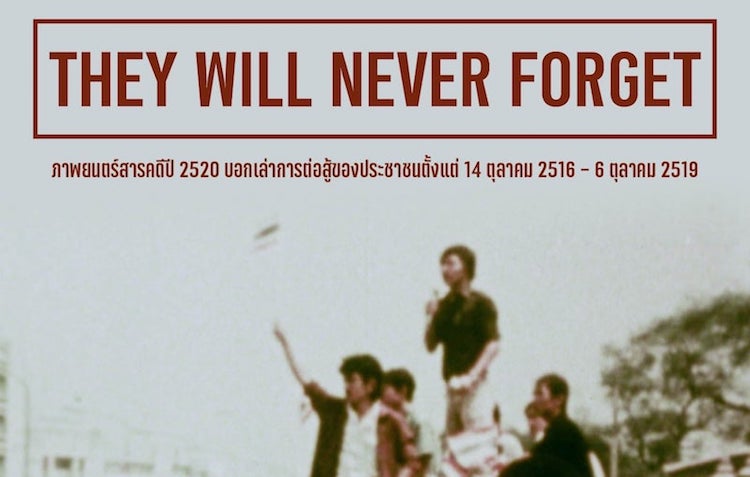
Yesterday, the Thai Film Archive screened the documentary They Will Never Forget on its YouTube channel. (It was previously shown at the Archive in 2017.) The film, which documents a strike by female workers at the Hara factory in Bangkok, was originally released in 1977. Directed by Ooka Ryuuchi, it was a co-production between independent filmmakers in Thailand and Japan.
The circumstances of the film’s production were similar to those of the Thai docudrama Tongpan (ทองปาน). Both films were celebrations of workers’ rights, made during the brief spell of democracy that followed the 14th October 1973 uprising. This period of optimism ended in a violent coup on 6th October 1976, which appears as a tragic epilogue in both films.
Following the 1976 coup, state censorship increased dramatically, though post-production of They Will Never Forget was completed in Japan, giving the filmmakers more freedom in their political commentary. The film condemns military dictator Thanom Kittikachorn, “whose hands were stained with the blood of at least seventy-six patriots,” and its assessment of the coup is equally honest and unrestrained: “The reign of violence and injustice was back.”
It also includes a surprisingly direct reference to student actors whose mock hanging led to the 6th October massacre. The film mentions media reports that an actor playing a hanging corpse “resembled the Crown Prince,” an issue that remains unspoken in Thailand even today. In contrast, the 2014 documentary Different Views, Death Sentence (ต่างความคิด ผิดถึงตาย ๖ ตุลาคม ๒๕๑๙) claimed only that students were accused of “severe ill-will to the Crown Prince”, without reference to the hanging; and the 2011 film The Terrorists (ผู้ก่อการร้าย) referred only to “the hanging of an important person in effigy.”
In hindsight, They Will Never Forget’s title was somewhat idealistic, because the massacre was indeed forgotten for twenty years, as Thongchai Winichakul discusses in his book Moments of Silence. Unfortunately, the titles of Napat Treepalawisetkun’s short film We Will Forget It Again (แล้วเราจะลืมมันอีกครั้ง) and Vasan Sitthiket’s video Delete Our History, Now! (อำนาจ/การลบทิ้ง) are more accurate comments on the whitewashing of Thai history.
The circumstances of the film’s production were similar to those of the Thai docudrama Tongpan (ทองปาน). Both films were celebrations of workers’ rights, made during the brief spell of democracy that followed the 14th October 1973 uprising. This period of optimism ended in a violent coup on 6th October 1976, which appears as a tragic epilogue in both films.
Following the 1976 coup, state censorship increased dramatically, though post-production of They Will Never Forget was completed in Japan, giving the filmmakers more freedom in their political commentary. The film condemns military dictator Thanom Kittikachorn, “whose hands were stained with the blood of at least seventy-six patriots,” and its assessment of the coup is equally honest and unrestrained: “The reign of violence and injustice was back.”
It also includes a surprisingly direct reference to student actors whose mock hanging led to the 6th October massacre. The film mentions media reports that an actor playing a hanging corpse “resembled the Crown Prince,” an issue that remains unspoken in Thailand even today. In contrast, the 2014 documentary Different Views, Death Sentence (ต่างความคิด ผิดถึงตาย ๖ ตุลาคม ๒๕๑๙) claimed only that students were accused of “severe ill-will to the Crown Prince”, without reference to the hanging; and the 2011 film The Terrorists (ผู้ก่อการร้าย) referred only to “the hanging of an important person in effigy.”
In hindsight, They Will Never Forget’s title was somewhat idealistic, because the massacre was indeed forgotten for twenty years, as Thongchai Winichakul discusses in his book Moments of Silence. Unfortunately, the titles of Napat Treepalawisetkun’s short film We Will Forget It Again (แล้วเราจะลืมมันอีกครั้ง) and Vasan Sitthiket’s video Delete Our History, Now! (อำนาจ/การลบทิ้ง) are more accurate comments on the whitewashing of Thai history.
